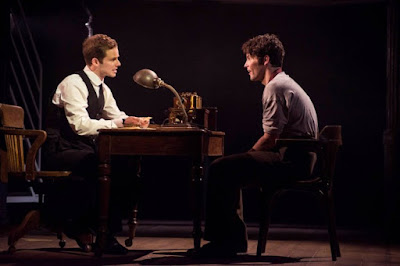The 50 shows that have stood out down the years and,
as we get up among the paint cards, the shows that have become the cast
recording of my life:
First performed: 1997, Lunt-Fontanne Theatre, NY
First seen by me: 2013, Southwark Playhouse, London
Productions seen: two
Score: Maury Yeston
Book: Peter Stone
Plot: April, 1912: the 'unsinkable' RMS Titanic leaves Southampton to sail across the Atlantic Ocean to New York with a cross-section of society aboard. It never arrived...
Score: Maury Yeston
Book: Peter Stone
Plot: April, 1912: the 'unsinkable' RMS Titanic leaves Southampton to sail across the Atlantic Ocean to New York with a cross-section of society aboard. It never arrived...
Five memorable numbers: GODSPEED: TITANIC, BARRETT'S SONG, LADY'S MAID, NO MOON, WE'LL MEET TOMORROW
There was a lot of raised eyebrows when it was announced that a musical was to appear on Broadway based on the sinking of the Titanic - it sounded like something from a comedy script; who would play the iceberg? Was the stage going to tip up or would they just flood the theatre? How would critics stop themselves from the obvious gags about the show going down with all hands etc.? But then something rather odd happened... it opened and although there were some mixed reviews, there were also some raves including this from the New Yorker: "It seemed a foregone conclusion that the show would be a failure; a
musical about history's most tragic maiden voyage, in which fifteen
hundred people lost their lives, was obviously preposterous [but] astonishingly, TITANIC manages to be grave and entertaining,
somber and joyful; little by little you realize that you are in the
presence of a genuine addition to American musical theatre." On the back of the positivity about it, I bought the Cast Recording and immediately fell in love with Maury Yeston's masterly score. It takes in a
wide range of contemporaneous musical styles of 1912: ragtime trots, Gilbert & Sullivan pastiches, stirring Elgar-esque
themes, choral work, hymns, folk airs, all filtered through a traditional Broadway
score of ballads and up-tempo numbers. TITANIC found an audience on Broadway and ran for nearly two years -
indeed, although James Cameron's film opened in December 1997, it
actually helped increase the show's attendance rather than the reverse
as was expected. At awards time, it won each of the five Tony Awards it was nominated
for including Peter Stone's sober book, Yeston's score and the big one, Best
Musical.
Then something even odder happened: TITANIC became a much sought-after show for amateur dramatic companies, final-year student productions and international companies who all realized that the show's minimalist designs, recognizable name and possibilities for large casts made it ideal for them. I had to wait 16 years until the Southwark Playhouse and director Thom Southerland took a chance on staging it and was completely won over by the show; I knew the score of course but loved how the late Peter Stone's book showed what could be achieved in storytelling within a musical setting and was struck how often he comes back to the fact that on Titanic everything depended on what class you were, even in the ultimate extreme of whether you lived or died. Three years later, Southerland was made Artistic Director of the equally snug Charing Cross Theatre and it was great that his first production was a revival of his Southwark Playhouse TITANIC, giving more people a chance to see it and experience Yeston's breath-taking score. Maury Yeston is represented by three musicals in my Top 50 - NINE (#39), GRAND HOTEL (#20) and now TITANIC (#19). They are three scores that glow with excellence. Now all together: "Sail on, Sail on / Great ship Titanic...."
There is a fair few TITANIC videos available on YouTube but they fall a bit short; the 1997 Broadway clips are not the best quality and most of the others are filmed amateur productions so I will stick to the trailer for Thom Southerland's Southwark production when it sailed over to the Charing Cross Theatre.




























